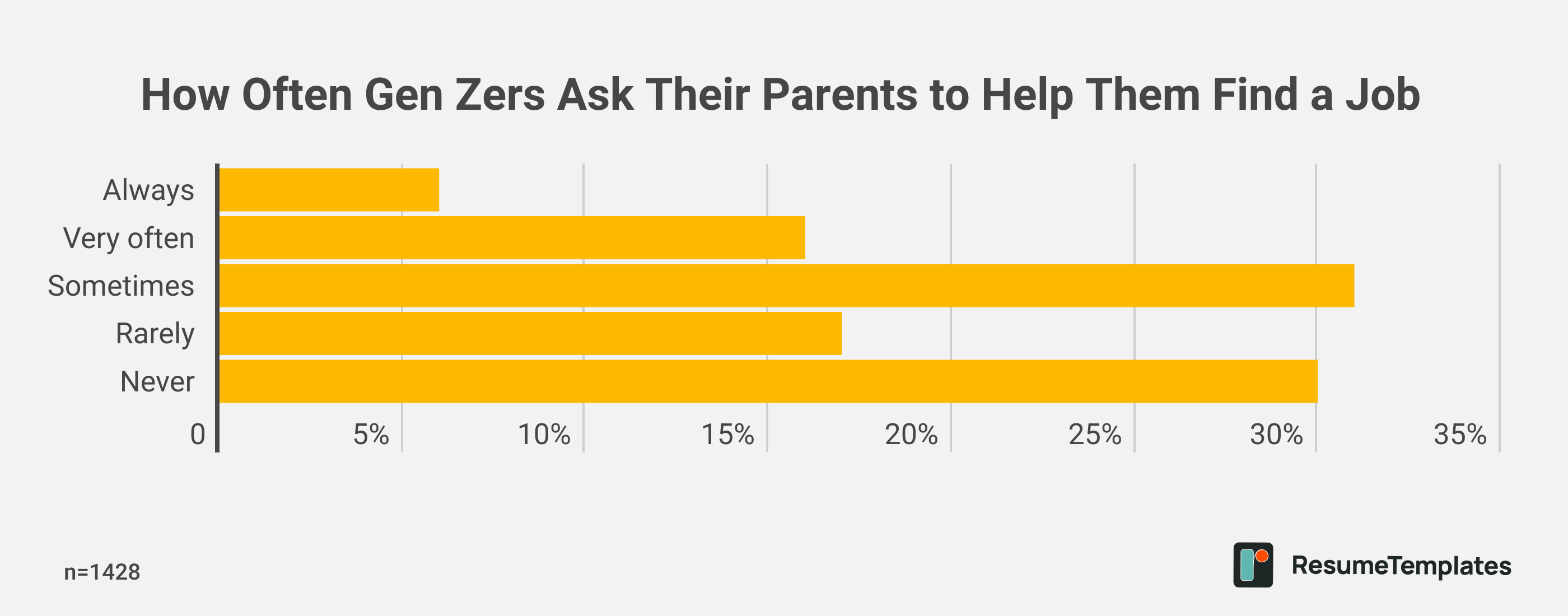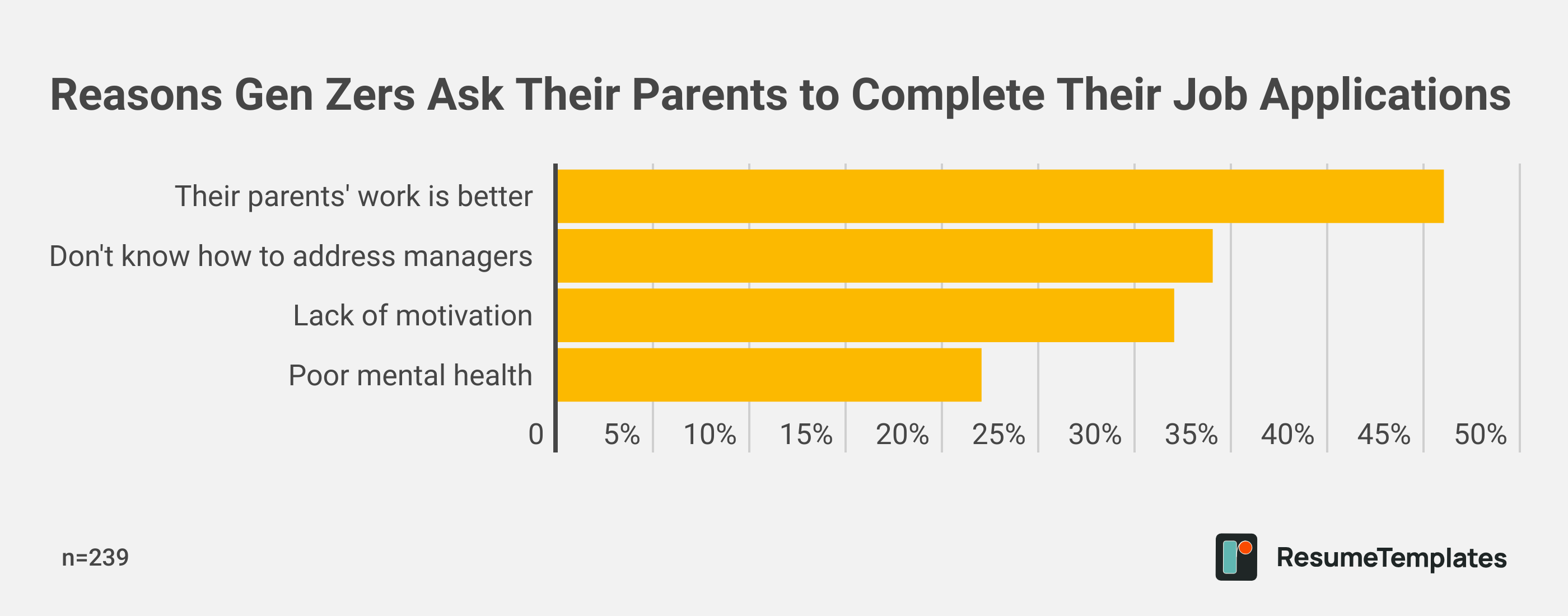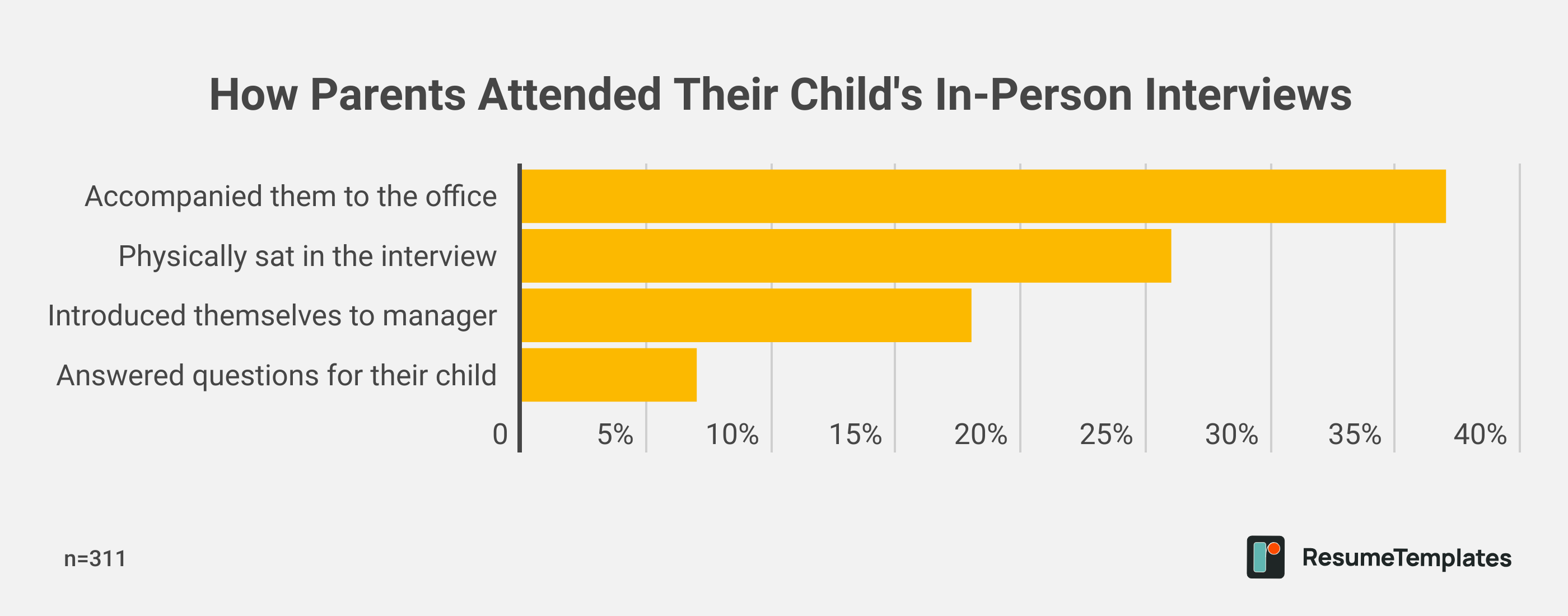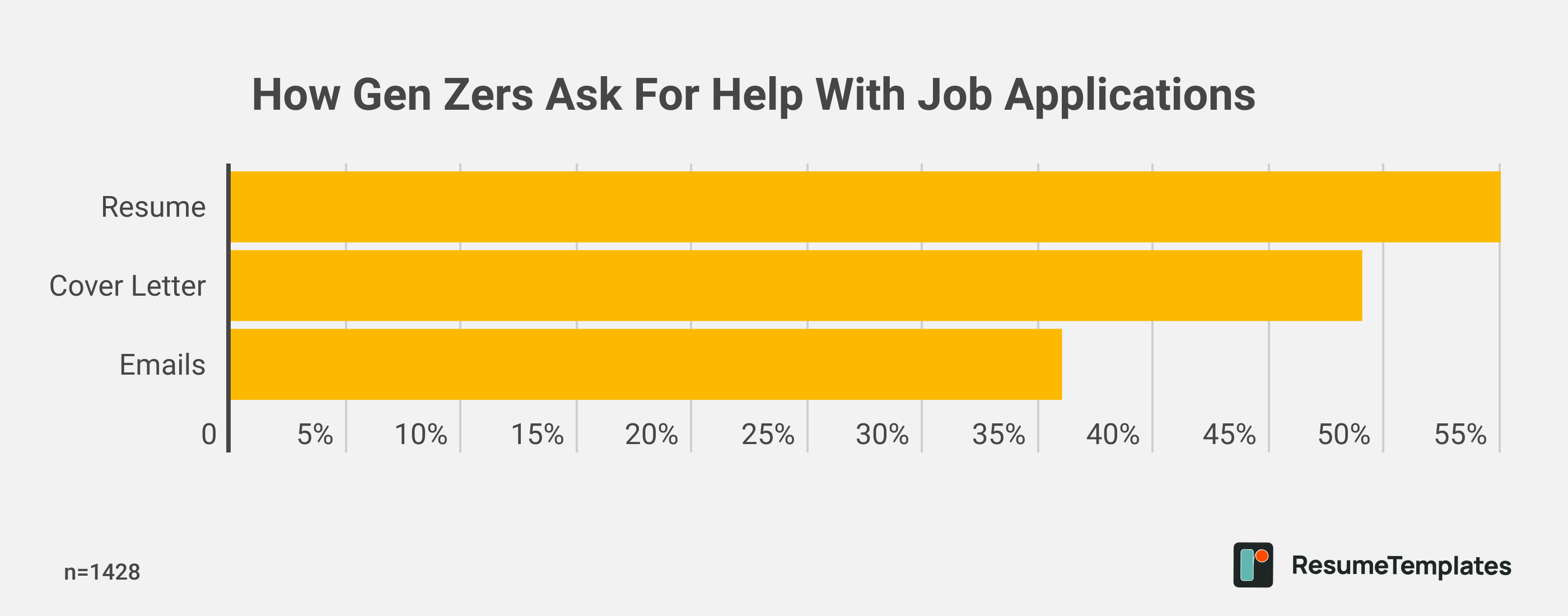Gen Z has a reputation for lacking the independence, motivation, and real world knowledge to contribute in the workplace.
In April, ResumeTemplates.com surveyed 1,428 U.S. based Gen Zers (ages 18 to 27) who looked for a job within the past year to understand how much they rely on their parents when job searching.
Study highlights:
- 70% of Gen Zers ask their parents for help in the job search process
- Of those who found a job, 83% credit success to parents
- 25% of Gen Zers brought their parents to interviews
- 16% say their parents submitted job applications for them
- 1 in 10 had their parents write their resume
7 in 10 Gen Zers Ask Their Parents to Help Them Find a Job
The majority of Gen Zers (70%) who engaged in a job search within the past year say they relied on their parents’ help with the job search process. Only 30% of Gen Zers we surveyed say they didn’t ask for their parents’ help in their recent job search.
Among those who did ask for help, 9% say that they always did, while 23% say they did very often, 44% say they sometimes did, and 24% say they rarely did.
It was more common for mothers to help their children than fathers, as 76% of Gen Zers who asked for help report getting help from their mother in comparison to 45% receiving help from their fathers.

“The number of employment opportunities and complexity of the job market are factors causing Gen Zers to seek parental help,” says ResumeTemplates’ Executive Resume Writer Andrew Stoner. “Knowing what a company does, verifying its legitimacy, and understanding what a specific job entails are tasks that can be challenging for someone without any formal work experience. A parent’s help should bolster a child’s development and eventual independence.”
8 in 10 Gen Zers who landed a job using parents’ help attribute success to parental guidance
Of Gen Zers who asked for help in their recent job search, 69% say that they have since found a job.
Of those recently employed, 83% fully (26%) or somewhat (57%) attribute their success to their parents, while only 17% say they don’t credit their parents at all.
1 in 6 Parents Directly Submitted Job Applications for Them
Among those who asked for their parents’ help, 24% (or 17% of the total sample) report that their parents submitted their job applications for them.
The top reasons Gen Zers ask their parents to complete and submit their applications include thinking their parents’ work is better (46%), not knowing how to communicate with hiring managers (34%), being unmotivated (32%), and poor mental health (22%).

“Parents submitting applications without involving their child is certainly not ideal,” explains Stoner. “Young workers will not gain practical knowledge and experience with the application process this way, and they will likely be less invested and prepared for an employer’s expectations during the interview process. If young workers lack motivation or knowledge, their chances for success in recruiting, and even more in the job, are limited.”
Majority ask their parents to find them job opportunities
Of surveyed Gen Zers, 60% say that they ask their parents to find jobs for them to apply to. This group says their parents have found them jobs to apply to through online resources (70%), personal connections (53%), networking (31%), and career fairs (23%).
Nearly 1 in 10 had their parents complete their HR screener calls
Among those who involve their parents in their job search, 13% (9% of those surveyed) report parents completing their HR calls.
When asked why they had their parents handle these calls, Gen Zers report that they believe their parents’ work is better than theirs (48%), not knowing how to talk to hiring managers (38%), lacking motivation (33%), and negative impacts on mental health (31%).
1 in 4 Gen Zers Take Their Parents to Interviews
Many Gen Zers involve their parents in their interview process. In fact, 26% of all Gen Zers who have undergone a job search in the past year say that they have taken a parent to an interview.
Of Gen Zers who brought their parent(s), 31% had a parent accompany them to an in-person interview, while 29% had them join a virtual interview.
For those who had a parent come to an in-person interview, 37% say that their parent accompanied them to the office, 26% say their parent physically sat in the interview room, and 18% say their parent introduced themselves to the manager. Additionally, 7% say their parents answered questions.

Of those who attended virtual interviews, 71% say their parent was off-camera, while 29% say their parent was visible on-camera. The majority (85%) of on-camera parents spoke directly to the hiring manager, and 85% fed information to their children.
“It’s understandable, parents wanting to ensure that their child does well in an interview or that an employer is reputable. Conversely, it’s hard to see where a parent being directly involved in an interview is appropriate,” says Stoner. “It does not signal confidence to a hiring company on behalf of the child. I recommend a ‘help at a distance’ approach of being available and advising the child during the recruiting process.”
1 in 8 Had Their Parents Write Their Resume From Scratch
The majority of Gen Zers get parental help when writing their resume. In the past year, 55% of Gen Zers say they asked their parent for help with their resume. Those who asked for resume help asked for assistance with proofreading (57%), editing resume text (38%), and even writing their entire resume (18%).
They asked for help because they have more faith in their parents’ work than their own (35%) and become stressed when writing resumes (35%). Additionally, many Gen Zers say they had their parents help because they do not know how to format (28%) or write (22%) a resume, or are too busy (14%).
Nearly 1 in 10 asked their parents to completely write their cover letters
With cover letters, Gen Zers also rely on their parents. Almost half (49%) of Gen Zers asked for help with their cover letters, asking for assistance with proofreading (55%), editing cover letter content (26%), or even writing the letter from scratch (13%).
Of this group, 35% say that they thought their parents’ work would be better than their own, and 28% asked for help because they were stressed.
Gen Zers also asked for help because they lack the skills to write cover letters; 28% report that they do not know how to format cover letters, and 25% say that they don’t know how to write them. Finally, 14% say that they were too busy to complete their own cover letters.
“While a parent writing a resume or cover letter isn’t necessarily an ethical concern, a child should be ready to fully discuss every aspect of their resume with a potential employer,” explains Stoner. “Broadly speaking, Gen Z can become more independent through a healthy partnership; one that is led by a willing parent and develops critical life skills.”
1 in 9 Had Their Parents Directly Communicate With Hiring Managers
Thirty-six percent of Gen Zers asked their parents to help correspond with hiring managers. They asked for assistance with editing messages (28%), writing them from scratch (21%) and directly communicating with hiring managers (20%).
They report asking for help because they trust their parents’ work more than their own (45%), don’t know how to communicate via email (30%), are lazy (26%), don’t know how to format messages (19%), and are experiencing mental health consequences (19%).

The survey was conducted in April 2024. In total, 1,428 U.S. respondents were surveyed. To take the survey, respondents had to answer that they have searched for a job in the last year and are within the ages of 18 to 27.